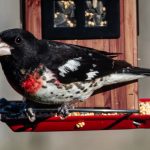Biting gnats, also called biting midges or no-see-ums, are minute flying insects of the Ceratopogonidae family. These insects are known for their painful bites, which cause discomfort to humans and animals. Biting gnats are most active in warm weather and typically inhabit areas near water, damp locations, and places close to livestock or poultry.
They are attracted to carbon dioxide, body heat, and moisture, making chickens attractive targets for their blood-feeding behavior. While often confused with mosquitoes due to similar appearance and behavior, biting gnats are smaller and have shorter lifespans. These insects can significantly stress chickens, potentially leading to reduced egg production, weight loss, and anemia in severe infestations.
Biting gnats pose a threat to both the comfort and health of chickens. Their presence can impact overall flock productivity. Understanding the characteristics and habits of these pests is essential for implementing effective control and prevention strategies to maintain the health and well-being of chicken flocks.
Table of Contents
- 1 Creating a Comfortable Environment for Your Chickens
- 2 Natural Repellents for Biting Gnats
- 3 Proper Grooming and Maintenance of Chicken Coops
- 4 Utilizing Protective Gear for Your Chickens
- 5 Regular Inspection and Treatment for Biting Gnats
- 6 Seeking Professional Help for Severe Infestations
- 7 FAQs
- 7.1 What are biting gnats?
- 7.2 How do biting gnats affect chickens?
- 7.3 What are some methods to keep biting gnats off my chickens?
- 7.4 Are there any natural predators of biting gnats that can help control their population?
- 7.5 Are there any health risks associated with using chemical insecticides to control biting gnats?
Key Takeaways
- Biting gnats are tiny insects that feed on the blood of animals, including chickens, and can cause irritation and discomfort.
- Creating a comfortable environment for your chickens, including providing proper ventilation and reducing standing water, can help deter biting gnats.
- Natural repellents such as essential oils, herbs, and diatomaceous earth can be used to keep biting gnats away from your chickens.
- Proper grooming and maintenance of chicken coops, including regular cleaning and removing wet bedding, can help prevent biting gnat infestations.
- Utilizing protective gear such as mesh netting and chicken saddles can help protect your chickens from biting gnats while they are outside.
- Regular inspection and treatment for biting gnats, including using traps and natural predators, can help control infestations and keep your chickens comfortable.
- Seeking professional help, such as consulting with a veterinarian or pest control expert, is important if you have a severe biting gnat infestation that is affecting your chickens’ health.
Creating a Comfortable Environment for Your Chickens
Coop Management and Cleanliness
Regular cleaning of the coop and removing any standing water or damp bedding can help eliminate potential breeding grounds for gnats. Maintaining cleanliness and good ventilation is essential in reducing the presence of biting gnats.
Providing Ample Space and Reducing Stress
Providing adequate space for your chickens to roam and dust bathe can help reduce stress and minimize the risk of gnat bites. Good airflow can help reduce moisture levels in the coop, making it less attractive to biting gnats.
Additional Measures for a Gnat-Free Environment
Installing screens on windows and vents can help prevent gnats from entering the coop while still allowing for adequate airflow. Providing shaded areas and natural barriers such as shrubs or trees can help create a more comfortable outdoor environment for your chickens, reducing their exposure to biting gnats. By implementing these measures, you can help reduce the risk of gnat infestations and ensure the overall health and well-being of your chickens.
Natural Repellents for Biting Gnats

Natural repellents can be an effective way to deter biting gnats from bothering your chickens. There are several natural ingredients that can be used to create homemade repellents that are safe for both chickens and the environment. Essential oils such as citronella, eucalyptus, lavender, and peppermint are known for their insect-repelling properties and can be diluted with water to create a spray that can be applied to the chicken coop and surrounding areas.
In addition to essential oils, herbs such as basil, rosemary, and mint can also be planted around the coop to help repel biting gnats. These aromatic plants not only add greenery to the environment but also serve as natural repellents against a variety of insects, including gnats. Furthermore, introducing natural predators such as predatory mites or parasitic wasps can help control gnat populations by preying on their larvae.
It’s important to note that while natural repellents can be effective in deterring biting gnats, they may need to be reapplied regularly to maintain their effectiveness. Additionally, it’s essential to ensure that any repellents used are safe for chickens and do not cause any adverse reactions. By incorporating natural repellents into your gnat control strategy, you can help create a more comfortable environment for your chickens while minimizing the risk of gnat infestations.
Proper Grooming and Maintenance of Chicken Coops
Proper grooming and maintenance of chicken coops are essential in preventing gnat infestations and ensuring the overall health of your flock. Regularly cleaning the coop and removing any accumulated debris or waste can help eliminate potential breeding grounds for gnats. It’s important to pay special attention to areas where moisture tends to accumulate, such as waterers, feeders, and bedding.
Keeping these areas clean and dry can help reduce the presence of biting gnats in the coop. In addition to regular cleaning, proper coop maintenance involves inspecting the structure for any potential entry points for gnats. Repairing any cracks or gaps in the walls, windows, or doors can help prevent gnats from gaining access to the coop.
Furthermore, using fine mesh screens on windows and vents can help keep gnats out while still allowing for adequate airflow. Proper grooming of your chickens is also important in preventing gnat bites. Regularly inspecting your flock for any signs of irritation or discomfort caused by gnat bites can help identify potential infestations early on.
Additionally, providing dust bathing areas with diatomaceous earth or wood ash can help chickens naturally repel gnats while keeping their feathers clean and healthy. In summary, proper grooming and maintenance of chicken coops involve regular cleaning, inspecting for potential entry points, and providing dust bathing areas for your flock. By implementing these measures, you can help prevent gnat infestations and ensure the overall health and well-being of your chickens.
Utilizing Protective Gear for Your Chickens
Utilizing protective gear for your chickens can help minimize their exposure to biting gnats and reduce the risk of gnat bites. Chicken saddles or aprons can be used to cover the back and wings of chickens, providing a physical barrier against gnat bites. These protective garments not only shield chickens from gnat bites but also help prevent feather damage caused by excessive pecking or mating behaviors.
In addition to protective garments, providing shaded areas or shelters with fine mesh screens can help create a safe space for your chickens to retreat from biting gnats. These shelters can be placed in outdoor areas where chickens spend most of their time, providing them with a comfortable environment while minimizing their exposure to gnats. Furthermore, utilizing natural repellents such as essential oil sprays or herbal plants around the coop and outdoor areas can help create an additional layer of protection against biting gnats.
By combining protective gear with natural repellents, you can help create a more comfortable and secure environment for your flock while reducing the risk of gnat infestations.
Regular Inspection and Treatment for Biting Gnats

Identifying Potential Infestations
Inspecting the coop and outdoor areas for signs of gnat activity, such as swarming insects or irritated chickens, can help identify potential infestations early on. Additionally, monitoring your flock for any signs of gnat bites or discomfort can help determine the severity of the infestation.
Controlling Gnat Populations
Once an infestation is identified, prompt treatment is essential in controlling gnat populations and minimizing their impact on your flock. Utilizing natural repellents such as essential oil sprays or herbal plants can help deter biting gnats from bothering your chickens while reducing their numbers. Additionally, introducing natural predators such as predatory mites or parasitic wasps can help control gnat populations by preying on their larvae.
Effective Treatment and Prevention
It’s important to note that while natural treatments can be effective in controlling gnat infestations, severe cases may require the use of chemical insecticides. When using chemical treatments, it’s essential to follow all safety precautions and ensure that any products used are safe for chickens and do not pose any health risks. By staying vigilant and proactive in gnat control, you can help protect your flock from infestations while ensuring their overall health and well-being.
Seeking Professional Help for Severe Infestations
In severe cases of gnat infestations, seeking professional help may be necessary to effectively control populations and minimize their impact on your flock. Pest control professionals have the expertise and resources to assess the severity of infestations and implement targeted control measures to eradicate biting gnats from your property. Professional pest control services may involve the use of chemical insecticides or specialized treatments to eliminate gnat populations while ensuring the safety of your flock.
It’s important to work with reputable pest control companies that have experience in dealing with gnat infestations in agricultural settings. In addition to professional pest control services, consulting with a veterinarian may be necessary if gnat bites have caused significant discomfort or health issues in your flock. Veterinarians can provide guidance on treating gnat bites and addressing any secondary infections or complications that may arise from severe infestations.
In summary, seeking professional help for severe gnat infestations involves working with pest control professionals and veterinarians to effectively control populations and address any health issues caused by gnat bites. By seeking professional assistance when necessary, you can ensure the well-being of your flock while minimizing the impact of gnat infestations on your property.
If you’re looking for ways to keep biting gnats off your chickens, you may also be interested in learning about how to create a garden chicken coop. This article from Poultry Wizard provides tips on how to incorporate your chickens into your garden space, which can help reduce the presence of gnats and other pests. Check it out here.
FAQs
What are biting gnats?
Biting gnats, also known as biting midges or no-see-ums, are tiny flying insects that feed on the blood of animals, including chickens. They are most active during dawn and dusk and are attracted to warm, moist environments.
How do biting gnats affect chickens?
Biting gnats can cause irritation, discomfort, and stress to chickens. Their bites can lead to skin irritation, itching, and potential secondary infections. Severe infestations can also lead to decreased egg production and weight loss in chickens.
What are some methods to keep biting gnats off my chickens?
– Providing a well-ventilated coop with screens to keep gnats out
– Using fans to create airflow and reduce gnat presence
– Applying insect repellents specifically designed for poultry
– Using natural remedies such as neem oil or diatomaceous earth
– Keeping the coop and surrounding areas clean and dry to reduce gnat breeding grounds
Are there any natural predators of biting gnats that can help control their population?
Yes, certain species of birds, bats, and predatory insects such as dragonflies and damselflies feed on biting gnats and can help control their population. Creating habitats that attract these natural predators can be beneficial in reducing gnat numbers.
Are there any health risks associated with using chemical insecticides to control biting gnats?
Yes, using chemical insecticides can pose health risks to both chickens and humans. It is important to carefully follow the instructions and safety precautions when using any chemical products around poultry. Consider consulting with a veterinarian or poultry specialist for safe and effective insecticide options.
Meet Walter, the feathered-friend fanatic of Florida! Nestled in the sunshine state, Walter struts through life with his feathered companions, clucking his way to happiness. With a coop that’s fancier than a five-star hotel, he’s the Don Juan of the chicken world. When he’s not teaching his hens to do the cha-cha, you’ll find him in a heated debate with his prized rooster, Sir Clucks-a-Lot. Walter’s poultry passion is no yolk; he’s the sunny-side-up guy you never knew you needed in your flock of friends!







